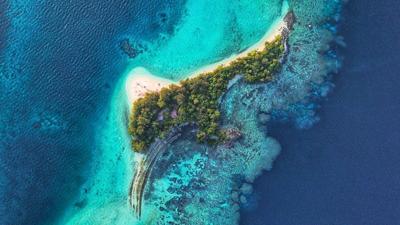As of June 2025, just听2.7% of the global ocean听is classified as fully or highly protected, according to , while total marine protection is only听8.4%.
The in April 2025, most notably the reopening of sections of the Pacific Remote Islands Marine National Monument to commercial fishing, slashed a third of the U.S.'s strongly protected waters, effectively erasing听0.3%听from the global protected area.
However, multiple positive commitments and pledges were announced during and after the third United Nations Ocean Conference (UNOC), held from听June 9 to June 13 in Nice, France.
Island Nations in the Pacific Push For Record-Breaking Ocean Protections
As of today, the听 near Antarctica, with its area of听746,000 square miles, isthe largest fully or highly protected Marine Protected Area (MPA) on Earth.
However, during the conference, The Solomon Islands听and听Vanuatu Governments unveiled plans to establish the to protect 2.3 million square miles. It is roughly the size of the Amazon rainforest and would be听three times larger than Ross Sea Region.
The reserve will unify the national waters of the Solomon Islands, Vanuatu, and Papua New Guinea. It will link them to the already protected Exclusive Economic Zone of New Caledonia, creating one of the world's largest interconnected ocean conservation zones.
President Moetai Brotherson of French Polynesia has also for an MPA spanning nearly 1.9 million square miles. More than 420,000 square miles will be designated as highly or fully protected.
The area would include听85,000 square miles听near the Society Islands and听263,000 square miles听around the Gambier Islands, where all industrial activity will be prohibited.
Additional artisanal fishing zones will extend total protection to听nearly 420,000 square miles, roughly twice the size of continental France.
Latin American Nations Surpassing Global Targets
Colombia, a听megadiverse nation听with a听1,800-mile coastline, ranks first in bird and orchid diversity and second in butterflies, freshwater fish, and amphibians.
Colombia was the first Western country to achieve the protection of 30% of its ocean territory back in 2022. Now, it is standing at 37.6%.
During this year's Ocean Conference, it the creation of an additional MPA covering the remote Serranilla and Bajo Nuevo coral reefs in the Caribbean Sea. This area will span听over 1,460 square miles to safeguard rich biodiversity and critical marine habitats.
Known for its shimmering and vast mountain range,听Chile听 the creation of a new MPA听around the听Salas y G贸mez and Nazca Ridges that will protect 1,802 miles of an underwater mountain chain and increase protection听around the听Desventuradas and Juan Fern谩ndez Islands.
This newly proposed area would build on Chile's existing commitment, adding to the听41% of its national waters already safeguarded.听
Croatia and Greece Expand Marine Protections in the Mediterranean
Famed for its mesmerizing in scenic national parks like Plitvice Lakes and Krka, Croatia is now bringing that same commitment to conservation to the sea.
During the conference, Croatian Prime Minister Andrej Plenkovi膰 听Croatia has expanded its marine protected areas from 12% to 32%听of its maritime territory. "Let the ocean breathe so that life may thrive again性视界传媒攁nd humanity may catch its breath," Plenkovi膰 said.
Greek Prime Minister Kyriakos Mitsotakis also announced the launch of听two new national marine parks, one in the Ionian Sea and another in the Southern Cyclades.
Tanzania Emerges as Africa's Voice for Ocean Protection
Best known for its , Tanzania now turns its attention seaward. It two new MPAs around Pemba Island, safeguarding over听500 square miles of vital marine ecosystems. The protected zones span the island's northeast and southeast coasts, preserving coral reefs, seagrass beds, mangroves, and habitats for threatened sharks and rays.听The country
These announcements are encouraging but still leave the world far from the听30% by 2030听target. Will it be the small island nations, often on the frontlines of climate change, that continue to set bold examples despite limited resources?听Will the United States be remembered as the nation that stepped back when the seas needed protecting most?






















